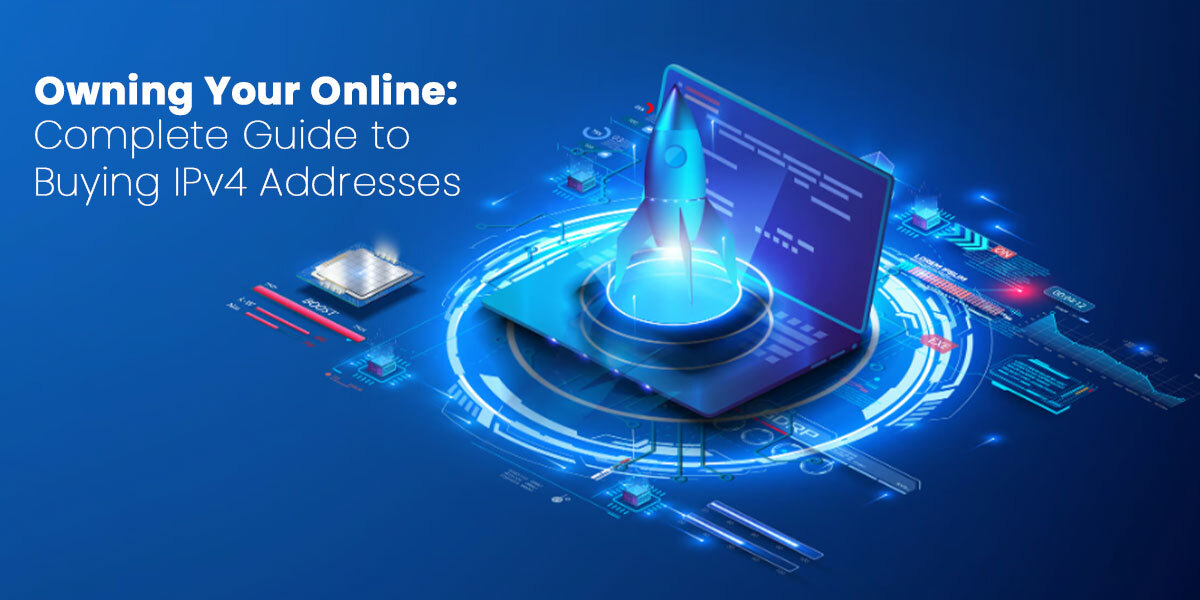![]()

January 10, 2024
Owning Your Online: Complete Guide to Buying IPv4 Addresses
In the vast digital landscape that we traverse daily, IP addresses play a pivotal role in connecting us to the World Wide Web. But have you ever wondered, in a world where you can purchase almost anything online, can you buy an IP address?
The answer is not as straightforward as adding an item to your virtual cart, and the intricacies of IP address ownership are shrouded in mystery. In this article, we’ll delve into the nuances of acquiring an IP address, exploring the possibilities, legal aspects, and implications of such a purchase.
Understanding the Basics: What is an IP Address?
Before embarking on the quest to buy an IP address, it’s crucial to grasp the fundamentals. An IP address, short for Internet Protocol address, is a numerical label assigned to each device participating in a computer network that uses the Internet Protocol for communication. It serves two primary functions: identifying the host or network interface and providing the location of the host in the network.
There are two types of IP addresses: IPv4 and IPv6. IPv4, the older version, uses a 32-bit address scheme, while IPv6, the newer version, boasts a 128-bit address scheme. As the demand for IP addresses surges, the question of whether you can buy one becomes more pertinent.
The Perplexity of Buying an IP Address
In the maze of the internet, the idea of purchasing an IP address might seem enticing, akin to claiming your slice of the digital realm. However, the reality is not as simple as buying a new gadget. IP addresses are not tangible commodities that can be owned in the traditional sense. Instead, they are allocated and managed by regional Internet registries (RIRs) on a global scale.
Who Holds the Power: Internet Service Providers (ISPs) and Dynamic IP Addresses
When you sign up for an internet service, your ISP assigns you an IP address. In most cases, this address is dynamic, meaning it can change periodically. The dynamic nature of these IP addresses is a cost-effective solution for ISPs, allowing them to efficiently manage their pool of addresses without running out.
If you’re pondering the possibility of buying an IP address, it’s essential to recognize that the control lies with the ISPs. They have the authority to allocate, revoke, and reassign IP addresses to their customers. This dynamic allocation model complicates the notion of purchasing a specific IP address for personal or business use.
Static IP Addresses: A Different Ball Game
While dynamic IP addresses are the norm, static IP addresses add a layer of complexity to the purchasing scenario. Unlike their dynamic counterparts, static IP addresses remain constant. Businesses often opt for static IPs for hosting websites, running servers, or accessing remote security cameras.
Acquiring a static IP address involves working closely with your ISP. Some providers offer static IPs as part of premium packages, allowing users to have a fixed online presence. However, this isn’t a straightforward purchase but rather a service add-on with associated costs.
The Legal Landscape: Can You Really “Own” an IP Address?
The perplexity deepens when we consider the legalities surrounding IP address ownership. In essence, IP addresses are leased rather than owned. When you sign up for internet service, you enter into an agreement with your ISP to use their IP addresses for communication. This lease agreement is subject to the terms and conditions outlined by the ISP.
Attempting to buy an IP address outside the framework of your ISP’s policies can lead to legal repercussions. IP addresses are valuable resources, and their allocation is regulated to prevent hoarding and ensure fair distribution. Engaging in unauthorized transactions related to IP addresses can violate the terms of service and result in severe consequences.
The Burstiness of the Black Market: Dark Corners of IP Address Trading
While the legal route involves working within the established system, a shadowy black market for IP addresses also exists. In the underbelly of the internet, individuals and entities engage in clandestine transactions, trading IP addresses like contraband.
However, treading into the dark corners of the IP address black market is not for the faint-hearted. It involves navigating through legal minefields, risking severe consequences, and exposing yourself to potential scams. Moreover, the addresses obtained through illicit means may be flagged and rendered useless by ISPs.
Conclusion: Navigating the Complex Terrain of IP Address Acquisition
In the ever-evolving landscape of the internet, the notion of buying an IP address presents itself as a perplexing puzzle. While the dynamics of dynamic IP addresses and the stability of static IPs offer varying options, the legal and ethical considerations cannot be overstated. Rather than attempting to circumvent the established systems, it is advisable to work within the framework provided by ISPs and adhere to legal channels for obtaining static IP addresses.
In the end, the question of whether you can buy an IP address is met with complexities and legal nuances. Understanding the intricacies of IP address allocation, dynamic and static models, and the potential risks associated with the black market provides a comprehensive view of the terrain. As we continue to surf the digital waves, let us navigate with awareness, respecting the rules that govern the vast virtual expanse.
FAQs
1. Can I buy a specific IP address online?
No, you cannot buy a specific IP address online in the traditional sense. IP addresses are managed and allocated by regional Internet registries (RIRs) and Internet Service Providers (ISPs). While you can request a static IP from your ISP, it is typically part of a service package rather than an individual purchase.
2. Are there legal consequences for buying IP addresses on the black market?
Yes, engaging in transactions related to IP addresses outside of legal channels can have severe legal consequences. It violates the terms of service with your ISP and may result in legal action. The black market for IP addresses is fraught with risks, including scams and the potential for addresses to be flagged by ISPs.
3. Why do businesses opt for static IP addresses?
Businesses often choose static IP addresses for stability and consistency. Static IPs are ideal for hosting websites, running servers, and accessing remote security cameras. They provide a fixed online presence, crucial for business operations.
4. Can I sell my IP address if I no longer need it?
In most cases, you do not own your IP address; it is leased from your ISP. Selling or transferring an IP address without the involvement of your ISP is typically not allowed and can lead to legal consequences. Check with your ISP for their specific policies.
5. Can I use a VPN to change my IP address?
Yes, using a Virtual Private Network (VPN) allows you to mask your original IP address and appear as if you are browsing from a different location. However, keep in mind that you are not buying or owning a new IP address with a VPN; you are temporarily borrowing one from the VPN provider
Recent Posts
Archives
- October 2024
- September 2024
- August 2024
- July 2024
- June 2024
- April 2024
- March 2024
- February 2024
- January 2024
- December 2023
- November 2023
- October 2023
- September 2023
- July 2023
- June 2023
- May 2023
- April 2023
- March 2023
- April 2022
- March 2022
- February 2022
- January 2022
- December 2021
- November 2021
- October 2021
- September 2021
- August 2021
- July 2021
- June 2021
- May 2021
- April 2021
- March 2021
- February 2021
- January 2021
- December 2020
- November 2020
- October 2020
- September 2020
- August 2020
- July 2020
- June 2020
- May 2020
- April 2020
- March 2020
- February 2020
- January 2020
- December 2019
- November 2019
- October 2019
- September 2019
- August 2019
- July 2019
- June 2019
- May 2019
- March 2019
- February 2019
- January 2019
- October 2018
- September 2018
- July 2018
- June 2018
- January 2018
- December 2017
- October 2017
- September 2017
- August 2017
- July 2017
- June 2017
- May 2017
- April 2017
- March 2017
- February 2017
- January 2017
- November 2016
- August 2016
- July 2016
- May 2016
- April 2016
- March 2016
- August 2015
Completely synergize resource is taxing relationships via premier are man niche markets. Professionally cultivate one to one customer.
Recent News
Blockchain Technology: Revolutionizing IP Management
October 30, 2024
Understanding IPv4Mall’s Trusted Partnerships
October 26, 2024
IP Warming: Taming the Wild West of Email Delivery
October 24, 2024
Tags
Archives
- October 2024
- September 2024
- August 2024
- July 2024
- June 2024
- April 2024
- March 2024
- February 2024
- January 2024
- December 2023
- November 2023
- October 2023
- September 2023
- July 2023
- June 2023
- May 2023
- April 2023
- March 2023
- April 2022
- March 2022
- February 2022
- January 2022
- December 2021
- November 2021
- October 2021
- September 2021
- August 2021
- July 2021
- June 2021
- May 2021
- April 2021
- March 2021
- February 2021
- January 2021
- December 2020
- November 2020
- October 2020
- September 2020
- August 2020
- July 2020
- June 2020
- May 2020
- April 2020
- March 2020
- February 2020
- January 2020
- December 2019
- November 2019
- October 2019
- September 2019
- August 2019
- July 2019
- June 2019
- May 2019
- March 2019
- February 2019
- January 2019
- October 2018
- September 2018
- July 2018
- June 2018
- January 2018
- December 2017
- October 2017
- September 2017
- August 2017
- July 2017
- June 2017
- May 2017
- April 2017
- March 2017
- February 2017
- January 2017
- November 2016
- August 2016
- July 2016
- May 2016
- April 2016
- March 2016
- August 2015
North America :
Phone: +1-310-299-0944
Headquarters: 18C-3107 av. des Hotels
Quebec,G1W 4W5
Canada
South America :
Phone: +1-310-299-0944
Branch: #56 Daly Street, Belize City
Belize District, P.O. Box 1825
Belize











Recent Comments